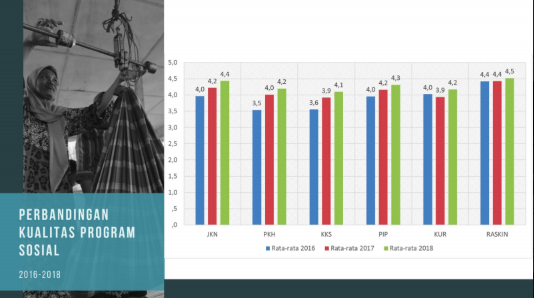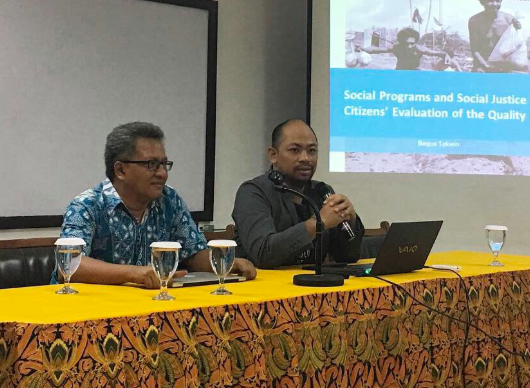Indonesia has a number of social programs that aim to give protection to the people. However, there have not been any official audits or evaluation of these programs that actively involve the public. In regard to this issue, Bagus Takwin (Faculty of Psychology, Universitas Indonesia) and Paksi Walandouw (Lembaga Demografi FEB UI), in collaboration with Infid (International NGO Forum on Indonesian Development) conducted a study on citizens’ evaluation of the quality of social programs in Indonesia. This study was presented at Lembaga Demografi FEB UI on Tuesday, 13 August 2019.
Social justice, which is defined as the equal access to wealth, opportunities, and privileges in a society, is the main goal of the government’s provision of social programs. This term includes the domains of poverty prevention, access to education, labor market inclusion, social cohesion and non-discrimination, health, and intergenerational justice. In Indonesia, these objectives are pursued through programs such as Program Keluarga Harapan (PKH), Jaminan Kesehatan Nasional (JKN), Kredit Usaha Rakyat (KUR), and many others. To understand people’s perception on social programs in Indonesia, data was collected through a multi-stage random sampling method in 34 provinces, yielding over 2,000 participants yearly from 2016 to 2018. Based on this data, the study found that while there is improvement every year about people’s perception of the government’s effort in achieving social justice, yet people still do not consider that the state of social justice is achieved. Among the list of social programs in Indonesia, most people believe that financial assistance for education, healthcare, and targeted assistance for the poor are the most needed. On the other hand, the programs that the people are most familiar with are the provision of health facilities, food assistance, health insurance progams, financial assistance for schools, and financial assistance for small and medium enterprises. Regarding the perceived quality of social programs, people’s assessment of the quality of almost every program has increased every year, with Raskin and JKN with the highest scores. Most people believe that every social program is highly beneficial, although still lacking in terms of targeting, speed, and ease of process.
To understand people’s perception on social programs in Indonesia, data was collected through a multi-stage random sampling method in 34 provinces, yielding over 2,000 participants yearly from 2016 to 2018. Based on this data, the study found that while there is improvement every year about people’s perception of the government’s effort in achieving social justice, yet people still do not consider that the state of social justice is achieved. Among the list of social programs in Indonesia, most people believe that financial assistance for education, healthcare, and targeted assistance for the poor are the most needed. On the other hand, the programs that the people are most familiar with are the provision of health facilities, food assistance, health insurance progams, financial assistance for schools, and financial assistance for small and medium enterprises. Regarding the perceived quality of social programs, people’s assessment of the quality of almost every program has increased every year, with Raskin and JKN with the highest scores. Most people believe that every social program is highly beneficial, although still lacking in terms of targeting, speed, and ease of process.
To improve the quality of social programs in Indonesia, Bagus proposed that regular audits are conducted by an independent team; standardization of programs; and a more systematic monitoring and evaluation process.
For the complete presentation and Q&A session, please refer to the video and materials provided.





